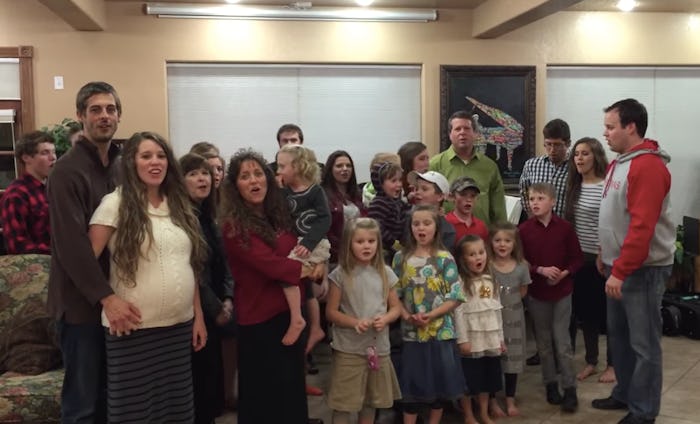The Duggar family's lifestyle and large family size raise a lot of questions about how they live, especially when it comes to their finances. Whether the Duggars pay taxes, where their money comes from, and how they pinch pennies are all topics of interest. While the family hasn't spoken out about their taxes in particular, they have shared details about some of their other financial decisions. They are saving money, that's for sure.
A number of online sources suggest that the Duggars classify their home as a church, and therefore are exempt from property taxes, however there is no evidence to support these claims. Romper has reached out to the Duggar family for comment but has not heard back at this time. I'm far from a tax attorney, but, judging by the IRS website, there is a possibility that they make use of that loophole. They have stated on numerous episodes of their popular TV show that they are a part of the "Home Church" community, meaning that they worship in their own home and record their sermons. The IRS guidelines for which organizations can claim tax exemption for religious purposes is intentionally vague and includes a number of classifications, such as:
A church, an interchurch organization of local units of a church, a convention or association of churches, an integrated auxiliary of a church, a church-affiliated organization..., a school below college level affiliated with a church or operated by a religious order, church-affiliated mission societies..., foreign countries, and an exclusively religious activity of any religious order.
In fact, it's actually pretty easy to qualify as a religious organization, and the IRS provides a handy how-to guide of sorts that the Duggars could have utilized. Rather than strive to weed out the false prophets, the IRS website explains that it errs on the side of belief:
The IRS makes no attempt to evaluate the content of whatever doctrine a particular organization claims is religious, provided the particular beliefs of the organization are truly and sincerely held by those professing them and the practices and rites associated with the organization’s belief or creed are not illegal or contrary to clearly defined public policy.
Organizations that seek to qualify must have some combination of church-like qualities such as recognized creed and form of worship, a distinct religious history, and established place of worship. Considering the Duggar family's Baptist background, much of their technical requirements would already have been met.
Even without church-based tax exemption, the Duggars do manage to save money in other ways. They buy everything used, they pay in cash to keep track of spending, make as many household products as possible, and rely on at-home haircuts, according to Babble. Even before the family made its TV debut, they were living debt free. Jim Bob started working in the real estate industry shortly after marrying Michelle, according to Business Insider. They also paid for their first home in cash, saving on mortgage payments. Savings from other strategic financial decisions such as itemized bills, bulk grocery shopping and storage, limited spending on entertainment, thrift shopping, energy efficient utilities, and alternative education choices add up quickly for such a large family. Business Insider estimated that the family saves thousands of dollars on haircuts alone.
The Duggars get a lot of judgement sent their way and the rumors of them not paying taxes haven't helped. There has been no official statement issued by the family about their tax filings, so anything that is online remains speculation. If the IRS is content allowing the people to decide for themselves whether or not they classify as a church, perhaps the public should be as well. After all, family finances are very private topic, even for those in the public eye.
Check out Romper's new video series, Romper's Doula Diaries:
Watch full episodes of Romper's Doula Diaries on Facebook Watch.
